|
|
|
Sort Order |
|
|
|
Items / Page
|
|
|
|
|
|
|
| Srl | Item |
| 1 |
ID:
093237
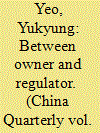

|
|
|
|
|
| Publication |
2009.
|
| Summary/Abstract |
This study explains the institutional structure and mechanism of economic regulation in China's telecommunications basic service industry. The case of telecoms basic service provides an excellent window to explore how Chinese leadership governs strategic state sectors whose assets and profits are central to the national economy. Challenging the ideational model of independent regulator, this study argues that the State-owned Assets Supervision and Administration Commission (SASAC) explains much of the telecoms business regulation, as the authority of the Ministry of Information Industry has been circumscribed by other party-state institutions. The SASAC's regulatory power suggests that the primary goal of the Chinese industrial economy is the best protection of state assets through the creation of large and strong state firms, not the protection of consumers' interests by breaking up the monopoly in markets.
|
|
|
|
|
|
|
|
|
|
|
|
|
|
|
|
| 2 |
ID:
143772
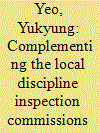

|
|
|
|
|
| Summary/Abstract |
Rampant corruption among China’s party members suggests that the existing system of party discipline is too fragile to function effectively. The question now is how the central leadership reinforces party supervision over leading cadres in both government and state firms. The Chinese leadership, after some period of experimentation, has introduced new institutions, named zhongyang xunshizu (central inspection groups), to complement the existing discipline system. This article examines how these central inspection groups complement the existing groups institutionally and normatively, and explores the Chinese Communist Party’s institutional engineering efforts to maintain legitimacy, organizational integrity and sustainability. This article considers these initiatives from the view of institutional complementarity and compensation. Theoretically, the application of institutional complementarity to China’s party discipline inspection should expand the scope of analysis into China’s institutional reform of party discipline. Empirically, the central inspection groups are the least known, but perhaps most significant, direct channel for central supervision of leaders in both local government and key state-owned enterprises. By comparing the rationale and operation of disciplinary inspection commissions (DICs), this article attempts to explain how the central inspection groups complement the supervision of local DICs in terms of scope, structure and methods of control.
|
|
|
|
|
|
|
|
|
|
|
|
|
|
|
|
| 3 |
ID:
120816


|
|
|
|
|
| Publication |
2013.
|
| Summary/Abstract |
Beginning in 2004, the Chinese central government introduced the concept of boards of directors to wholly state-owned enterprise groups (guoyou duzi qiye jituan, ). Increasingly, creating external boards (waibu dongshi, ) has also been emphasized to realize effective corporate governance. This latest state effort exemplifies how the Chinese party-state is searching for feasible-but not necessarily the best-ways to accommodate market-oriented institutions with local political-economic realities, thus creating its own regime of corporate governance. To this end, this study examines the rise of external boards, standing committees, and the rules of two-way interventions (shuangxiang jinlu, ).
|
|
|
|
|
|
|
|
|
|
|
|
|
|
|
|
| 4 |
ID:
106783
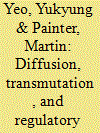

|
|
|
|
|
| Publication |
2011.
|
| Summary/Abstract |
Marketization and state restructuring are proceeding apace in China and Vietnam. China and Vietnam are not, however, converging upon the global regulatory model, even allowing for customary national variations. Rather, they are building up distinctive forms of regulatory regimes aiming to maintain the party-state's control over key state sectors, while at the same time integrating with the global economy and conforming to international norms and standards. This study argues that the regulatory model being adopted in Vietnam and China is the product of a specific kind of transition from a command to a market economy within an authoritarian political regime. While diffusion theories are of use in identifying external driving forces for the reform effort, these theories are of limited value for unveiling the dynamics of local contexts. Indigenous incentives, opportunity structures, and the experimental nature of public policy explain why, despite their exposure to global reform movements and commitment to multilateral institutions, China and Vietnam are likely to end up not with just a variety of the same regulatory regime, but a different one. The case of telecommunications regulation is used to illustrate this.
|
|
|
|
|
|
|
|
|
|
|
|
|
|
|
|
| 5 |
ID:
190707
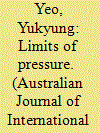

|
|
|
|
|
| Summary/Abstract |
In the context of economic interdependence, South Korea, like other countries with asymmetrical trade relations with China, is often seen by its citizens as vulnerable to China’s use of economic power to gain political influence. However, South Korea’s deployment of the THAAD (Terminal High Altitude Area Defense) offers the opposite perspective on South Korea’s vulnerability. Despite China’s coercive policies against South Korean businesses and great leverage over Korea’s economy, China failed to generate a concession regarding Korea’s decision to deploy the THAAD. The question is why? Drawing on the 2016–17 THAAD crisis between South Korea and China, I argue that influence of coercive power will depend on the coercive state’s willingness to pay a cost, the target state’s level of stateness, and the relative intensity of interests related to the policy. This case study helps us understand the circumstances under which China’s use of economic coercion against target countries may be successful.
|
|
|
|
|
|
|
|
|
|
|
|
|
|
|
|
| 6 |
ID:
173795
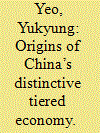

|
|
|
|
|
| Summary/Abstract |
In this study, I analyse the historical origins of China’s distinctive tiered economy by employing the analytic framework of a complex adaptive system to examine how the process of change involves selection, interaction among elements, and variation in types, which ultimately lead to adaptation. I argue that the rise of China’s tiered economy can be traced back to the Mao era and that it was enhanced throughout Deng’s economic reforms. To elaborate on this argument, I first describe how Mao’s invisible hand planted the seeds of the tiered economy. Selection at the strategy level and the resulting variation are examined as Mao’s adaptive tactics for nurturing the industrial sector. This mechanism of selection was also maintained to partially embrace market forces in Deng’s early era of reform. I then closely examine how Deng’s vision of the socialist market economy provided the party-state with raw materials for adaptation, deepening its tiered economy.
|
|
|
|
|
|
|
|
|
|
|
|
|
|
|
|
| 7 |
ID:
085510
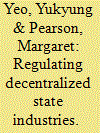

|
|
|
|
|
| Publication |
2008.
|
| Summary/Abstract |
A growing body of literature on China's "regulatory state" has analysed the efforts of the Chinese government to regular strategic yet highly centralized state-owned industries. Yet how does decentralization affect this need for regulation? This article analyses the pattern of regulatory governance for one of China's most decentralized but strategic industries, the auto industry.
|
|
|
|
|
|
|
|
|
|
|
|
|
|
|
|
| 8 |
ID:
092159
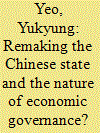

|
|
|
|
|
| Publication |
2009.
|
| Summary/Abstract |
This report explains the shifts and strains in the 2008 super-ministry government reform, focusing on the reform of government institutions of economic governance. Drawing on interviews with officials and scholars in Beijing after the reform, and on Chinese-language reports and books, this study suggests that the key to substantial progress in remaking the Chinese state into a macroeconomic regulator is the reform of the National Development and Reform Commission (NDRC), which was lacking in the 2008 scheme. Its powerful authority for investment endorsement is particularly problematic. A continued administrative malaise in the energy sector and strategically articulated state engagement in industrial development also should be noted as the salient features of China's economic governance.
|
|
|
|
|
|
|
|
|
|
|
|
|
|
|
|
|
|
|
|
|